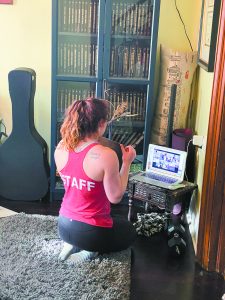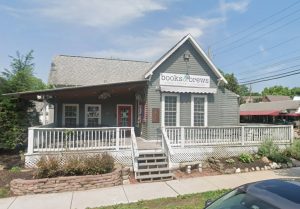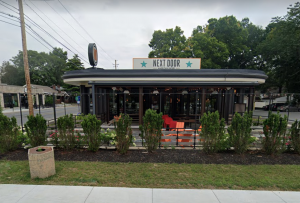Q&A with Jacob Cantu, West Fork Whiskey tasting room manager
Cantu has created the distillery’s cocktail-to-go concept, which has been a significant boost to revenue amid the COVID-19 outbreak.
Cantu has created the distillery’s cocktail-to-go concept, which has been a significant boost to revenue amid the COVID-19 outbreak.

On the day Rachel Priddy finally got word from her contractor that she could apply for a certificate of occupancy to open her coffee shop in Carmel, Gov. Eric Holcomb ordered all restaurants to shut down in-person dining.

Naptown Fitness is offering its members a different kind of carryout as a way to stay healthy while gyms are closed during the pandemic.

About 60% of the company’s sales typically happen at lunch and are delivered to workplaces, which have been stripped down to only the most essential people.

The company is cutting more than 100 employees and furloughing others as it weathers the temporary shutdown of much of the retail industry.
The move—while expected—extends the pain for a hospitality industry that is reeling from closures that have eateries on the brink.
Millions more are in danger of being furloughed or fired as chains reel from nationwide closures that started about two weeks ago and have totaled nearly 50,000 locations.

The firm is keeping its options open for the site—including upgrading the existing building or redeveloping it entirely.
The one-day strikes had little impact on consumers, but the unrest called attention to mounting discontent among low-wage workers who are on the front lines of the pandemic.

Macy’s, Kohl’s and Gap Inc. all said Monday they will stop paying tens of thousands of employees who were thrown out of work when the chains temporarily closed their stores and sales collapsed as a result of the pandemic.

Sahm’s Restaurant Group has retooled its operations to benefit the not-for-profit Second Helpings and to create a series of marketplaces, where customers can get takeout meals as well as grocery items.
A group called the Gig Workers Collective is calling for a nationwide walk-out Monday. They’ve been asking Instacart to provide workers with hazard pay and protective gear, among other demands.
Sales ticked up in February—but that was before the coronavirus all but shut down the local economy.
In this April 24, 1943, photo, workers at the United States Rubber Plant in Indianapolis look over deflated inner tubes at standing work tables.
The mother and daughter have temporarily shuttered their floral and gift shop in Salesforce Tower.

Donald and Leslie Bolinger’s vaguely Old World-looking Carmel home seems like it belongs in one of Indianapolis’ historic neighborhoods.

With revenue down because of banned dine-in services, some eateries are taking advantage of the governor’s order allowing more restaurants and breweries to temporarily offer carryout and delivery of alcohol.
The county ordered liquor stores, banks and insurance companies to cease normal operations and shift to offering only drive-thru, delivery and curbside services.

Designs for the project were approved in 2018 and included nine condos, 4,500 square feet of ground-floor retail space and a 17-space underground parking garage.

Upscale restaurant Hedge Row and the more casual Next Door both opened in Indianapolis in 2018. Both are part of The Kitchen Restaurant Group founded by Kimbal Musk.